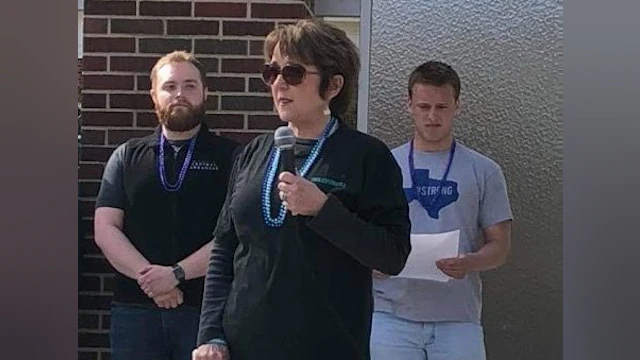Mar. 19, 2019 - AFSP volunteer Mary Meacham founded the first University of Central Arkansas (UCA) Out of the Darkness Campus Walk in 2011 after the death of her son Kyle. Since then, she has continued to create awareness through her team Miles for Kyle, which has raised over $84,000 for AFSP’s Arkansas chapter.
A semi-retired teacher, Mary serves on the board of the Arkansas chapter, as well as being program chair, and personally leads AFSP education programs such as Talk Saves Lives, It’s Real, and More Than Sad, as well as the AFSP-endorsed suicide prevention programs safeTALK and ASIST. Since first becoming involved, she has participated in four Out of the Darkness Overnight Walks.
This year, Mary worked tirelessly to spread suicide prevention education programming to the entire state.
What first led you to start the first UCA campus walk, and get involved in AFSP?
My son, Kyle, died by suicide on March 2, 2010. There truly are not words to describe the devastation our family felt. We were left asking ourselves how our loved and cherished child, with all his gifts, could have felt so hopeless and in pain that the only way he felt he could stop it was to end his life.
I desperately needed to see and talk to another mother who had lost a child to suicide, but I didn’t yet know of any way to connect with anyone else who shared that experience. As I began trying to process my grief, I read everything I could about suicide, and stumbled upon the website for the American Foundation for Suicide Prevention.
I attended AFSP’s Survivor Day event in Little Rock, Arkansas in November of 2010. There, I met a few volunteers, but mainly focused on the documentary they showed, which featured other suicide loss survivors. The people on screen seemed to be reading my mind as they spoke about their own loss.
Now that I realized I was not alone, I read about AFSP’s Out of the Darkness Walks. This planted the seed that ultimately led to my getting involved in my local chapter, and in 2011, helping to organize the first Out of the Darkness Campus Walk in Arkansas, at the University of Central Arkansas.
You’ve accomplished a great deal this past year in terms of bringing AFSP education programs to your state. Are there any specific challenges you feel your community faces in terms of suicide prevention?
Because Arkansas is a very rural state, it has been a challenge providing AFSP’s programs and services to all areas. As a board member, it is a personal goal of mine to build a trained group of volunteers representing all parts of Arkansas who are able to bring AFSP’s resources to their own communities. I am happy to say we have had a record year for providing suicide prevention education to Arkansans. To date, our chapter has held 138 events, providing suicide prevention training to over 2,000 people, with more on our calendar before the end of the year.
My fellow AFSP colleagues in Arkansas, Tyler West and Christopher Epperson and I put together a training day to introduce volunteers to our programs, educate them about suicide prevention, and even provide them with guidance on how to organize and deliver our programs themselves. Our plan is to take this training to five different locations in Arkansas each year and build capacity within each region so everyone in Arkansas has access to suicide prevention programs. These training events also help us get to know our volunteers, so we can do a better job of matching them to specific program requests as they come up. Our hope is that the volunteers we train one year can pass along their knowledge to other people, so that they may do the same.
By the end of the year, our chapter will have taken AFSP Programs, or AFSP-endorsed education programming, to every region of our state.
What’s next for your chapter?
We are currently piloting a new project, Lifesaver Schools, that give schools recognition for organizing suicide prevention educational events for students, faculty and staff, and their communities. We got the initial information out any way we could, including mailers, emails, social media, etc., and asked interested schools to register. We then sent out a tool kit of ideas and resources. Schools that meet our requirements for suicide prevention programming will earn an AFSP Arkansas ‘LifeSaver’ school designation, receive a banner, and will be highlighted through our social media channels. Hopefully, we will get some media coverage as well, encouraging more schools to do the same.
Our chapter has had more requests for suicide prevention programs than ever this year. I feel like the seeds we have planted in years past are finally starting to grow!
This piece originally appeared as a Volunteer Spotlight Story in AFSP’s 2018 Annual Report.
